Crazy Like A Kudu
(Marie-Mail entry #43)
CAPE TOWN TO WINDHOEK, NAMIBIA
AUGUST 7
My friend Nikki used to drive overland trucks through Africa and Asia. When I nervously asked her about traveling alone from Cape Town to Victoria Falls, she'd laughed.
"Easy," said Nikki. You could do it in your sleep."
I took her at her word and bought two overnight bus tickets on Intercape Mainliner. The first would take me from Cape Town to Namibia, where I planned to spent ten days on a "Crazy Kudu" trip. The second ticket was for the Namibia to Victoria Falls, Zimbabwe, route.
We pulled out of Cape Town on Tuesday morning, stopping the Los Angeles-looking suburb of Durbanville before pulling out to the asphalt highway that stretched through the grassy plains and hills.
"Green hills of Africa," I mused, before realized I had not just invented the phrase.
We left Toys 'R' Us, Dial-A-PC, and 7-11 behind us and soon it was just our double-decker bus and various Toyotas, Hondas, and 4x4s, barreling north on the pristine tar.
The bus wasn't full, and I had two seats to myself. The passengers were a mixture of tourists, South Africans, and Namibians. Several German-speaking Namibians were on board -- they startled me into reading the guidebook chapter on Namibia, and its past status as a German colony.
Like all 21-hour bus rides, the trip was interminable. We stopped for junk food and Customs, where I struggled to use my real passport but was thwarted.
"Where did South Africa stamp you out?" asked the officer.
"Uh, here," I said, fumbling and producing passport #2.
He stamped me in, ignoring my real passport. Apparently my passport did not need to be valid for six months past my entry date, as my second passport expires in January of 2002.
Our dinner stop was for cheese sandwiches. I stared forlornly at the lactose-filled dairy and wondered if I could make a meal out of seventeen Tic-Tacs.
WINDHOEK TO WATERBERG PLATEAU
AUGUST 8
We pulled into a central Windhoek parking lot at 5:30 a.m.
"Not much of a bus station," I thought.
Still, Ephraim from the Cardboard Box hostel was there as promised by e-mail. He drove me and two European women to the hostel, where I showered, had coffee, and stored some stuff I wouldn't need in Namibia.
The Cardboard Box was having a chaotic-hostel sort of morning, where nothing looked like it should work but somehow, everything did. Backpacker's stuff was scattered everywhere, couples were using the showers, and everyone was tripping over each other in the kitchen. It was nice of them to let me use their facilities, and I was embarrassed to be paying nothing for the privilege.
"Are you Marie?" asked a 30-something-ish stocky man with wet, sandy-blond hair.
"Yeah -- how do you know that?"
"I saw your name on the list of people coming in this morning. My name is Shawn."
Shawn was distracted by a greeting, and then he left the hostel altogether.
I sat in the common area and waited for the Crazy Kudu van pickup. Four others were waiting as well, but they were traveling with a competing company called "Wild Dog." The two companies had similar itineraries, identical equipment, and had both come into existence at the same time. The two owners had been friends once, but had fallen out when one seemed to swipe the other's idea. It wasn't clear if one had copied the other, or if both had similar ideas at the same time.
What was clear was that I had stumbled onto the Crazy Kudu website through an internet search, but had never heard of Wild Dog before today. Naturally, I had gone with the Kudu, although it never was clear to me what was so crazy about a kudu.
The van showed up just before nine. To my surprise, Shawn was the driver. Gwynneth, the ever-helpful Crazy Kudu booking agent, was there as well, and she had me sign my life away before I handed my pack up to Shawn for roof storage.
 Breakfast comes to you in Namibia
Breakfast comes to you in Namibia
A pastry truck pulled up and started to sell baked goods to backpackers, the same way an ice cream truck would sell Popsicles at home.
"I love Namibia!" I said. "Breakfast comes to you."
I was the last one in the van, so I got the fold-down jumpseat. Our group consisted of five Italians, one Israeli-Italian, a Swedish couple, me, and one unspecified other passenger who had missed a connecting bus and hoped to join us tomorrow.
Andrea, one of the Italians, had lost his luggage on the flight over. Gwynneth said she'd try to get it forwarded to our first campsite, but everyone was skeptical.
The van was just big enough for ten passengers, so we were lucky to be short one. We drove out of Windhoek, past a modern shopping complex and a few hotels.
When I'd thought of going to Namibia, I hadn't thought of shopping malls, German cities, drinkable water, and pristine toilets. But that's exactly what I was presented with.
 a challenging game
a challenging game
We stopped at a gas station and I went into the ladies room. Modern, clean, flushing, and no charge! I stuck my nose back in my guidebook, where I learned that South Africa had been given German-colonized Namibia to watch over after World War I. Namibia had built the same infrastructure and government as South Africa until 1989, when Namibia gained independence as part of the Angola-South Africa war settlement.
I hadn't even realized that South Africa and Angola had been at war and was embarrassed by my ignorance. Cuba, backed by the USSR, had fought on the Angolan side, while the USA had back South Africa. Shawn -- then a South African citizen -- had spent three years in jail as a conscientious objector instead of going to war. He had learned to garden and cut hair there, and had earned a degree in conservation later. He'd then spent months alone in remote Namibian reserves, observing mongoose and counting zebra. He was freelancing for Crazy Kudu, and had his own upscale safari company, Namib Adventure Safaris, on the side. Later in the month, he was scheduled to take four New Yorkers around Namibia.
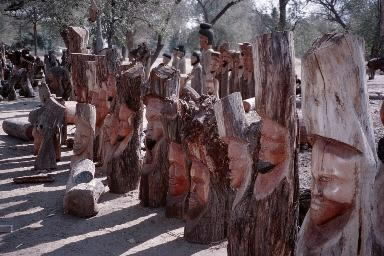 crafts village
crafts village
We stopped at an enormous dusty outdoor crafts village, where I would've been in heaven if I'd been in the market for a wooden elephant. Then, silently, our group continued on to Waterberg Plateau Park.
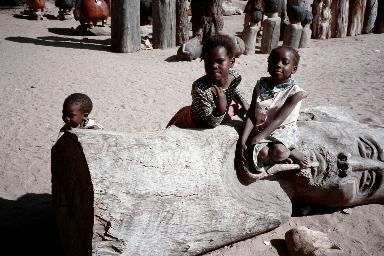
First days on group trips are always hard. Either everyone is quiet, or someone tries too hard to impress everyone else and won't shut up. In our case, we all just stared out the windows for five hours.
When we reached our campsite, Shawn gave us a quick lesson in erecting a tent. I had my own tent as the odd one out, and Crazy Kudu used three-person tents to house just two people, so I had a three-person mansion all to myself.
Lars and Carina, the Swedish couple, could put up a tent in their sleep. They turned out to be the most experienced among us in wilderness living. Both were Ph.D. candidates -- he in molecular biology, she in economics. Carina was currently teaching in Windhoek, and Lars had joined her for a quick look around Africa before they were both scheduled to go back to Sweden.
I, on the other hand, always needed help to put up my tent, and had a Ph.D. in nothing. Still, I didn't let that stop me from having important scientific discussions with Lars on the probability of turning large and green from gamma radiation overdoses, or of gaining the proportionate strength of an arachnid based on the bite of a radioactive spider.
We took an afternoon hike up the plateau.
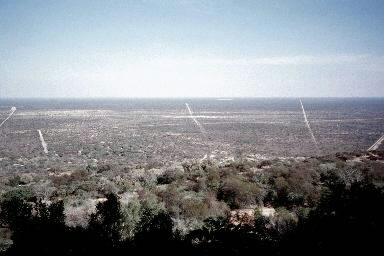 view from Waterberg Plateau
view from Waterberg Plateau
Waterberg Plateau is similar to Ayers Rock in Australia. It didn't pop up out of the ground -- the ground fell away from it, leaving just the big sandstone bit in the middle. The top is a wildlife sanctuary for rare species, which thrive there because the plateau is inaccessible to poachers.
We didn't see any roan antelope or white rhino on our hike, but we did spot a few "rock rabbits." They looked familiar.
"That's no rock rabbit," I said. "That's a penguin-rat!" I'd seen similar rodents on Table Mountain in Cape Town and had named them myself.
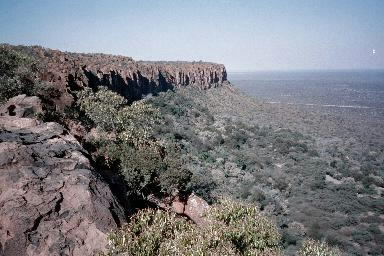 Waterberg Plateau
Waterberg Plateau
Shawn laughed. Encouraged, I asked him my burning Namibian wildlife question.
"Does Namibia have a version of the yeti?"
Sadly, the answer was no.
Dinner was steak and potatoes, cooked on the campfire. Yaron, the Israeli-Italian, was served a tasty gem squash as he had a strictly kosher diet.
I had a hot shower and noted that the ablution blocks had bathtubs and dishwashing facilities. Namibia was still surprising me.
The weather surprised me too. Hot by day, Namibia got icy cold at night. I was glad for the Polar-Tec fleece sleepsheet I'd bought in Cape Town.
WATERBERG PLATEAU TO ETOSHA NATIONAL PARK
AUGUST 9
"This is a full-participation safari," Shawn reminded us. So Claudia from Italy took the breakfast dishes, I took the blue dishwashing bag, and off we went to the ablution block.
When we returned with our sparkling clean plates, our group had a new member. Sam, the guy who'd missed the bus on day one, had found his way to Waterberg.
He was an actual Namibian. Shawn was too, but he was a naturalized Namibian, whereas Sam could even lay claim to a tribe. Same worked at the Namibian tourist office in Frankfurt, Germany, and was with us to learn about Crazy Kudu and the idiosyncratic creature known as the "tourist."
The tents came down, and the luggage went on top of the van, where it was secured with a tarp and a rope. The tents fit in the van, and the food and mattresses stashed away in a trailer.
I took the passenger seat up front. Sam happily took the jumpseat, and never complained about it. He was even able to sleep in it, and did so often.
We pulled out of Waterberg. There was some murmuring from the back.
"Can we please stop to see is Andrea's bag is here?" asked Claudia. Fluent in several languages, she was the designated English-speaker among the four Italians over 30.
No one had mentioned the bag to Shawn before. He'd been on the roof when Gwynneth had promised to send the bag on to Waterberg.
The bag was at the camp's office.
"I wish he'd thought of that before we packed the luggage," groused someone.
But he wouldn't have. Andrea, while I couldn't understand Italian, was clearly a funny, quirky fellow. He was a pianist by profession, had brought a bathrobe on safari, and was known to keep his pajamas in the freezer.
We drove out of Waterberg on a dirt road, and onto paved highway B1. We stopped in Otjiwaronga for groceries, and Andrea noticed something odd under the van.
It was steadily leaking gas.
"I thought they fixed that," said Shawn. He popped back into the grocery store to buy soap and sugar, which he combined with water and pasted over the hole in the gas tank.
"We did this in Australia," commented Carina. I looked at her with new respect. I was still learning that Lars and Carina had the skills to outlast a nuclear winter, or at least to win "Survivor."
 Lake Otjikoto
Lake Otjikoto
We drove a few hours to Lake Otjikoto, a deep limestone sinkhole, where a tame warthog patrolled the grounds.
 warthog
warthog
"Does he bite?" asked one of the younger Italians.

A groundskeeper shook his head no.
We all crowded around to pet the warthog. He was bristly to the touch and left slimy warthog snot all over my palm.
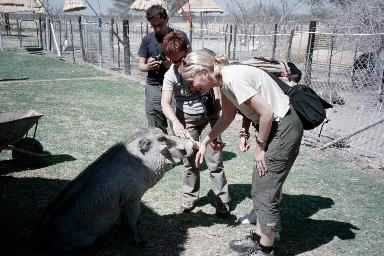 new friend
new friend
In early afternoon, we pulled into Lake Etosha National Park. We were spending two nights at Namutoni campground before moving on to spend a third night at Okaukuejo camp, some 140 kilometers away.
Etosha was, according to my guidebook, "undoubtably one of the world's greatest wildlife viewing venues." We set up our tents quickly (the campground was enclosed), raced through a lunch of cucumber and cold generic meat sandwiches, and headed out on a game drive.

I had my new camera and 75-300 lens with me, and was excited to have a chance to use it.
We drove less than three minutes before a giraffe practically walked up, smiled and said "cheese."
"Bellissimo!" said an Italian.

Everyone else gasped and grabbed for their cameras. Shutters clicked. My own beautiful new Canon made a sickly growl.
"Uh-oh," I said.
"Maybe it's the batteries," said Shawn.
"They're brand new," I replied. To humor him, I let him put my batteries on the van's dashboard, to warm them up in the sun. I felt around for my point-and-shoot, and realized I had left it back at the camp.
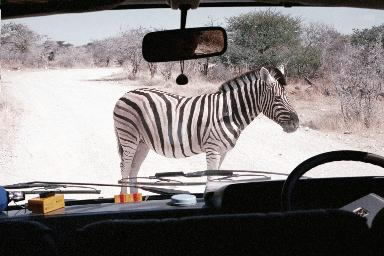
We drove on, passing hundreds of zebra, oryx, springbok, very un-crazy kudu, warthogs, vultures, and loads of giraffe. Everyone else shot photos. I tried to commit the scenes to memory.
Game drives consist of slow driving between waterholes, with frequent stops for animal viewing and wildlife-crossing.
Eventually, I put the sunbathed batteries back into my camera and tried again.
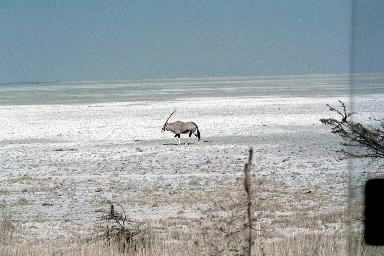
"Click... whirr... whirr..." My Canon was still sick. I removed the lens.
"Click!" It worked fine. My gorgeous new 75-300 lens was broken.
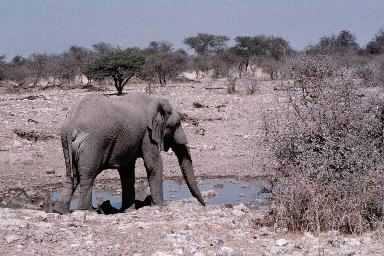
Back at camp, I walked over to the local waterhole. The whole campsite was fenced in, but one section had small grandstands overlooking a waterhole just outside the fence. I sat with other tourists and watched for a long time. Only birds came to drink.
ETOSHA
AUGUST 10
Breakfast with Crazy Kudu was cereal and milk, bread with condiments, and instant coffee. I had my lactose-intolerance, so I traveled with instant oatmeal. My own coffee can only be explained by a Nescafe intolerance. It is just as easy to make real coffee as it is is to make instant. In East Timor, I had learned to make coffee simply by spooning in grinds and hot water, and letting the grinds sink before drinking.
For now though, I was still using camping filters that I had picked up in Germany. The others found this odd, and made no secret of it.
We took another game drive, and this time I got photos with my normal lens. Unfortunately, no giraffe walked up to say "cheese."

The heat drove us all into the campsite pool in late afternoon. It was on the grounds of the hundred-year old German fort that the camp was based around. The water was freezing, so no one was able to stay in for long.
Our evening drive was not fruitful. All the animals were on holiday. We pulled up at one waterhole, wondering why so many cars were there. Could they all be staring at the sole thirsty zebra?

No. They weren't staring at anything. Everyone was just waiting, hoping that some animals would come to drink. We were in a crowd of ten cars, all staring at nothing.
A Namibian school bus pulled up. The driver looked at me and mouthed "what?"
"Nothing," I mouthed back, shrugging. He laughed and drove his bus away.
At dinner, Shawn told us stories of traveling on a Namibian passport. He had been strip searched at airports, and treated with disdain because many people had never heard of his country. In the U.S., an African-American had refused to believe that Shawn (of European descent) was African.
"But I am African," said Shawn. "I'm more African than you are!"

The man had been astonished. Like the man, I had not realized how many races were represented in Africa.
After dinner, Sam spouted off an interesting viewpoint.
"Do you see these overland trucks?" He asked, motioning towards the nearby groups and their large vehicles. "What kind of people go on vacation for months?"
I didn't realize the question was rhetorical, and tried to answer him.
"Many of them are students, or people who are changing jobs, getting divorced, or going through a lifestyle change. Lots of them just want to travel without spending too much money."
Sam wasn't interested.
"Why would they go for months in such a vehicle? Don't they want jobs?"
He obviously had missed the discussion in which I'd told the group that I was without job, home, or income and was traveling the world.
"How much does it cost?" He asked, still obsessed with overland trucks.
"The longest trips go for nine months and can cost upwards of $10,000," I answered.
This outraged Sam.
"Don't they have anything better to do? Why don't they give their money to charity?"
I had no answer for that. It hadn't occurred to me to continue working and give away the profits.
NAMUTONI TO OKAUKUEJO
AUGUST 11
The morning was host to series of ridiculous events.
First, Shawn had to go down the road to find his shoes. He was sleeping outside so that Sam and I didn't have to share a tent, and jackals had stolen his shoes during the night.
Then, Yaron and Selmi, two 25-year-old Italians, couldn't get their tent packed. People went to help them but it mysteriously wouldn't pack. Then, Sam made a discovery.
"There is a mattress in this tent!"
Sheepishly, the guys removed the mattress. They were trying to best Lars and Carina at tent skills, but were doing a hopeless job of it.
Then Lars shut the van door on Shawn's finger. He let out a dreadful yelp.
Lars looked concerned, but he was not one to mince words.
"I'm really sorry but you shouldn't have had your hand there," he said bluntly.
The damage to Shawn's finger was not serious. He recovered and drove us out of Namutoni. We were en route to Okaukuejo, to spend a night in a different part of Etosha.
We stopped for breakfast in a fenced-in area with a picnic table and two outhouses.
"Are you on a special diet or something?" asked Sam. I was eating my usual instant oatmeal, while everyone else ate cereal with milk.
"I can't have dairy," I explained.
"Can you have goat's milk?" he asked.
"Yes."
"Marie, the next time you come to Namibia you must visit my village. I will reserve a special goat just for you."

I thanked Sam politely and we drove off, passing giraffe, oryx, springbok (springing wildly in a way called "pronking"), warthogs, elephants, and zebra (pronounced zeh-bra outside of the States). We stopped at one waterhole crowded with wildlife.
Carina studied a vulture through her binoculars, and saw a movement just north of it.
"What is that?" she wondered aloud. "Is it... YES, it is! It is a lion!"
Sharp-eyed Carina had spotted a waving tail. Upon closer inspection, we discovered that the tail was attached to a lioness, who was lazing about with three of her friends.
The lion got up slowly and walked towards the waterhole. Every animal nearby snapped to attention. Springboks and zebra alike froze and watched.
"Shawn, how does a zebra's stripes protect it? It looks nothing like the surrounding landscape," I pointed out.
"When they are all running together, the lion cannot distinguish shapes within the group."
One cheeky warthog decided to have a drink. He trotted bravely up to the pool. The lion spotted him and nonchalantly started to move in his direction, stalking cagily.
We all got excited. I was rooting for the warthog. All the other animals watched with seeming anxiety.
The warthog was no fool. He finished quickly and strolled away at a more rapid clip than he'd used on his initial approach.
The lion couldn't be bothered to follow. She lay down, as if she didn't care for warthog steak anyway. The other animals went about their business, with a ever-watchful eye on the lions.

"Shall we go?" asked Shawn. We moved on.
"I hate lion," he said to me in a low voice. "Everyone wants to see lion, and they ignore all the birds and other animals. And sometimes we don't even see lions, and then everyone is disappointed."
"How many lions are there here?" I asked.
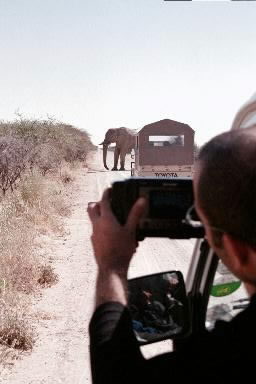
"Four to six hundred at last count, but they stray to kill cows because it's easy, and then farmers shoot them."
At the next waterhole, Sam lost his temper. He was sure he'd seen someone step out of a car to snap a photo.
"Did you see that?" he said. "A man just got out of his car! If I had the papers, I'd fine him right now. These are wild animals. People should never get out of cars here."

He calmed down a minute later when eagle-eyed Carina spotted a hyena loping across the plain.
"Bellissimo!" said an Italian.
"Look, there's more. Maybe they're going in for a kill," said someone. "Oh, wait, no, that oryx, not hyena."
 waterhole
waterhole
The next campsite had a world-famous waterhole, which anyone can watch via its webcam. We sat for hours and watched masses of animals come to drink. We saw black rhino, some of which made odd bleating sounds while sparring. A breeding herd of ten elephants dropped by, along with the usual springbok and one old, farting elephant.
 Shawn cooks our dinner
Shawn cooks our dinner
The Okaukuejo waterhole attracts hundreds of visitors a day, and not all are respectful of the "quiet, please" sign. It was incongruous to watch rhino and elephant, while I was surrounded by beer-guzzling, chatting tourists and breathing secondhand smoke.
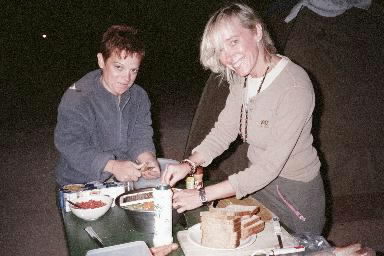 Rita and Claudia make a salad
Rita and Claudia make a salad
Dinner was spaghetti, which afforded the Italians ample opportunity to declare "needs more salt" and "not enough garlic." Afterwards, we sat by the fire and chatted. I asked Shawn about one aspect of Africa that I did not understand.
"Does anyone know why HIV spreads so fast in Africa?"
In Africa, HIV has rampantly spread throughout the heterosexual, non-intravenous drug using population. In nearby Zimbabwe, the average lifespan used to be 60. Now it was 35.
"Sure, it is because people have other STD's first. HIV works fast on an open sore."
I was embarrassed to have not figured that out on my own, and also a little sorry I'd asked.
NEXT: Soap, sand, and looking at etchings! Little Germany in Namibia, and the meaning of "buy a donkey."